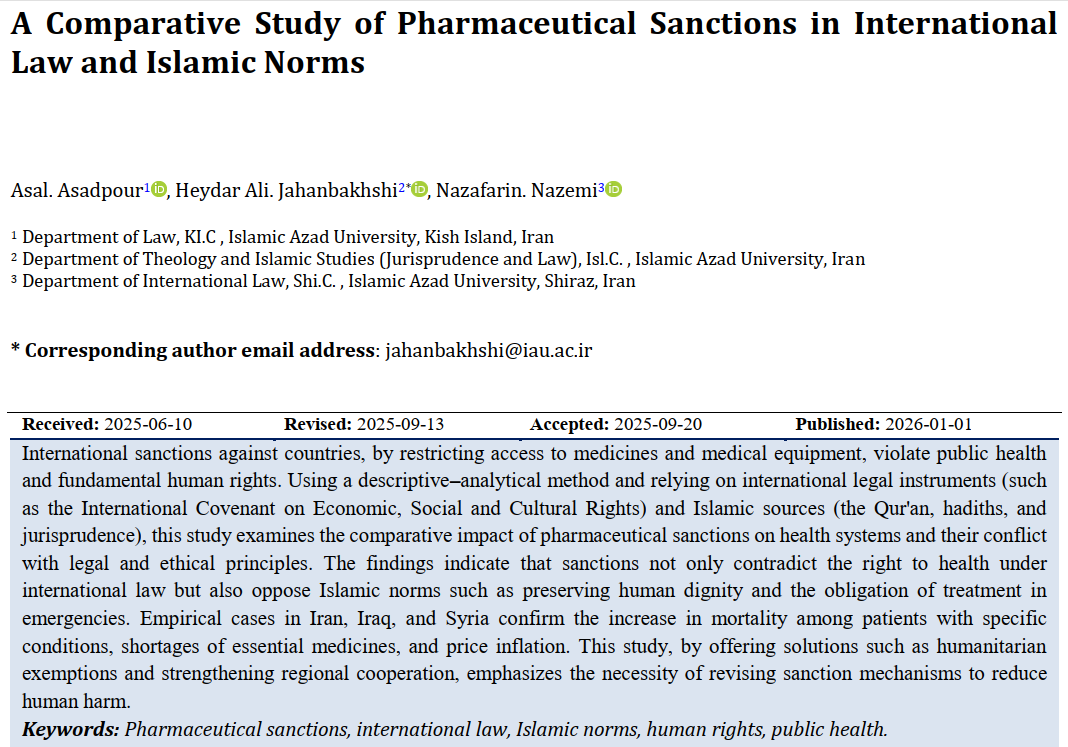A Comparative Study of Pharmaceutical Sanctions in International Law and Islamic Norms
Keywords:
Pharmaceutical sanctions, international law, Islamic norms, human rights, public healthAbstract
International sanctions against countries, by restricting access to medicines and medical equipment, violate public health and fundamental human rights. Using a descriptive–analytical method and relying on international legal instruments (such as the International Covenant on Economic, Social and Cultural Rights) and Islamic sources (the Qur'an, hadiths, and jurisprudence), this study examines the comparative impact of pharmaceutical sanctions on health systems and their conflict with legal and ethical principles. The findings indicate that sanctions not only contradict the right to health under international law but also oppose Islamic norms such as preserving human dignity and the obligation of treatment in emergencies. Empirical cases in Iran, Iraq, and Syria confirm the increase in mortality among patients with specific conditions, shortages of essential medicines, and price inflation. This study, by offering solutions such as humanitarian exemptions and strengthening regional cooperation, emphasizes the necessity of revising sanction mechanisms to reduce human harm.
Downloads
References
Abdollahi, A., Shirazi, H., & Abdollahi, M. R. (2021). The Direct Impact of Sanctions on Physical and Mental Health. Razi Journal of Medical Sciences, 28(3), 229-245.
Aghaei, M., & Rezagholizadeh, M. (2018). Impact of economic and commercial sanctions on Iran's trade relations and their major trading partners. Strategic Studies of public policy, 8(28), 49-68.
Al-Albani, M. N. a.-D. (2008). Jami' Adhkar al-Nabawi. Dar al-Mu'ayyad.
Alavi, Pourzadeh, Ghafouri, & Mahmoudi. (2021). Consequences of International Sanctions on the Sports Industry. Quarterly Journal of Applied Research in Sports Management.
Behamiri, M., & Mohammadi, E. (2018). The Right to Health in the International Human Rights System. 3(19), 1-5.
Boutros-Ghali, B., & Secretary-General, U. N. (1995). The United Nations and Human Rights, 1945-1995.
Garfield, R. (1999). Morbidity and mortality among Iraqi children from 1990 through 1998: Assessing the impact of the Gulf War and economic sanctions. New York, USA.
Habibi, M. (2007). The Right to Health in the International Human Rights System. Bi-quarterly Journal of International Law, 2(1), 7-38.
Hakim, a.-N. (2006). Al-Mustadrak 'ala al-Sahihayn. Dar al-Kitab al-'Arabi.
Hufbauer, G. (2007). Economic sanctions reconsidered. Peterson Institute for International Economics.
Ibn Qayyim, a.-J. (2004). Zad al-Ma'ad (Vol. 4). Mu'assasat al-Risala.
International Law, C. (2001). Draft articles on responsibility of states for internationally wrongful acts. Yearbook of the International Law Commission, 2(2), 49.
Katzman, K. (2015). Iran sanctions. Congressional research service. (pp. 1-77).
Kokabisaghi, F. (2018). Assessment of the effects of economic sanctions on Iranians' right to health by using human rights impact assessment tool: a systematic review. International Journal of Health Policy and Management, 7(5), 374. https://doi.org/10.15171/ijhpm.2017.147
List, C. (2011). WHO MOdel List Of Essential MediCine5.
Mahoney, K. E. (1993). Human Rights in the Twenty- First Century. (pp. 481-493).
Majlisi, M. B. (1951). Bihar al-Anwar. Mu'assasat al-Wafa.
Mashhadi, A., & Rashidi, M. (2015). The Effects of Imposed Sanctions against Iran on Environment, Energy & Technology Transfer in International Law. Public Law Resears, 16(46), 103-123.
Mazhari, M., & Soleimaninejad, N. (2023). The Impact of Sanctions on the Breach of Human Rights Obligations of the Imposing State During Global Pandemics. Islamic human rights studies, 12(1), 31-48.
Minister of, H. (2002). Treatment Action Campaign et al. 2002 (5) SA 721(cc); 2002(10 BCLR 1033CC).
Patel, B. N. (2000). Case Concerning Questions of Interpretation and Application of the 1971 Montreal Convention Arising from the Aerial Incident at Lockerbie:(Libya v. United Kingdom). In The World Court Reference Guide (pp. 617-626). Brill Nijhoff. https://doi.org/10.1163/9789004481237_134
Patel, B. N. (2014). Questions of Interpretation and Application of the 1971 Montreal Convention arising from the Aerial Incident at Lockerbie (Libya v. USA). In The World Court Reference Guide and Case-Law Digest (pp. 37-46). Brill Nijhoff. https://doi.org/10.1163/9789004261891_005
Portela, C. (2016). Are European Union sanctions "targeted"? Cambridge Review of International Affairs, 29(3), 912-929. https://doi.org/10.1080/09557571.2016.1231660
Qazvini, I. M. (2001). Sunan Ibn Majah. Dar Ibn Hazm.
Rajabi, M. (2022). An Examination of International Sanctions and Human Rights Standards (with an Emphasis on Multilateral Sanctions Against Iran). Islamic human rights studies, 11(1).
Sadat Akhavi, S., Maleki Azinabadi, J., & Ruhollah. (2017). Drug Restrictions Resulting from International Economic Sanctions Against the Islamic Republic of Iran and the Violation of International Human Rights Standards. Strategic Political Research, 1(1), 21-46.
Secretary, G. (2013). Report of the Secretary-General on the situation of human rights in the Islamic Republic of Iran. (pp. 37-38).
Setayesh, S., & Mackey, T. K. (2016). Addressing the impact of economic sanctions on Iranian drug shortages in the joint comprehensive plan of action: promoting access to medicines and health diplomacy. Globalization and Health, 12, 1-14. https://doi.org/10.1186/s12992-016-0168-6
Shafi'i, M., & Akhavan, B. (2019). U.S. Sanctions Against the Islamic Republic of Iran from an International Law Perspective.
Wood, M., & Sthoeger, E. (2022). The UN Security Council and international law. Cambridge University Press. https://doi.org/10.1017/9781108692373
Yasin Abdi, A., & Ketabi Roudi, A. (2014). The Place of the Right to Health in Islam and International Law. Social Security, 13(2-3), 99-124.
Zahrani, M. (1997). Theories of Economic Sanctions, Collection of Articles.
Zare, H., Trujillo, A. J., Leidman, E., & Buttorff, C. (2013). Income elasticity of health expenditures in Iran. Health Policy and Planning, 28(6), 665-679. https://doi.org/10.1093/heapol/czs106
Zarei, H. M., Rezaeenezhad, I., & Babaei, M. A. (2020). The United States of American Economic Sanctions Against Iran after Joint Comprehensive Plan of Action and Its Impact on the Health of Patients Including Quaid 19 (A Case Study: Islamic Republic of Iran). 69-76. https://doi.org/10.52547/nkums.12.3.69
Ziaei, S. Y., & Mohammadi Motlagh, A. R. (2014). Sanctions Against Individuals from the Perspective of International Law with an Emphasis on Sanctions Against Certain Iranian Nationals. Judiciary Legal Journal.

Downloads
Additional Files
Published
Submitted
Revised
Accepted
Issue
Section
License
Copyright (c) 2025 Asal Asadpour, Heydar Ali Jahanbakhshi, Nazafarin Nazemi (Author)

This work is licensed under a Creative Commons Attribution-NonCommercial 4.0 International License.





